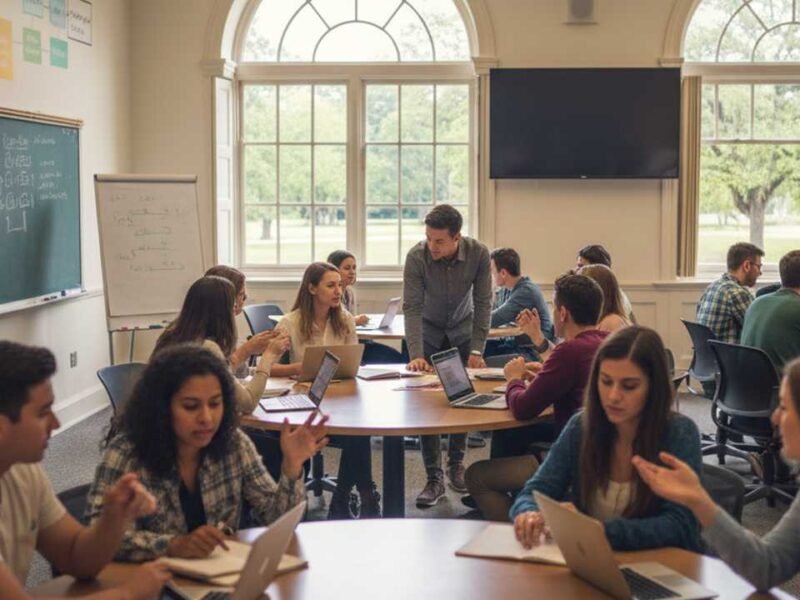The Urgent Shift Toward Hands-On Education
In today’s fast-changing world, where industries evolve faster than academic syllabi can catch up, experiential learning has emerged as a game-changer. Employers no longer want graduates who merely understand theory; they want individuals who can act, solve, adapt, and lead in unpredictable, high-pressure environments. The era of passive learning is over, and institutions that fail to embrace this revolution risk leaving their students unprepared for the real world. The sense of urgency surrounding this transformation is palpable – students who do not engage in practical, immersive learning experiences may find themselves left behind, watching opportunities slip through their fingers. Experiential learning bridges the gap between classroom theory and actual work environments, turning abstract concepts into tangible skills. With lifelearn client education as a driving force, institutions are discovering innovative methods to empower learners through real-world applications that translate directly into job readiness.
Imagine a student who has spent years studying business management but never negotiated a deal, led a team, or resolved a crisis under pressure. Contrast that with another student who participated in simulation-based training, internships, and live client projects. The difference is staggering – and employers see it instantly. Experiential learning cultivates not only technical expertise but also emotional intelligence, critical thinking, and adaptability – qualities that can’t be memorized but must be lived. As global competition intensifies, the demand for agile, job-ready graduates grows stronger every day. This is why higher education institutions must act now to integrate experiential learning as a central pillar of their curriculum, ensuring every graduate steps confidently into their career, equipped to thrive, not just survive.
Bridging the Divide Between Academia and Industry
The disconnect between academic theory and the needs of modern employers has long been a source of frustration. Too often, graduates enter the workforce armed with degrees but lacking the experience to navigate real-world challenges. Experiential learning eliminates that divide by embedding industry realities directly into the educational process. Through initiatives like live projects, internships, and partnerships with corporate entities, universities are creating environments where students can gain firsthand exposure to workplace dynamics. This exposure fosters a sense of realism, transforming classrooms into laboratories of professional growth. In this dynamic setting, lifelearn client education plays a pivotal role, empowering learners to collaborate with clients, analyze authentic data, and solve real business problems in real time.
Consider a digital marketing student developing a campaign for an actual client through lifelearn client education. The stakes are tangible; success means real-world results. This level of responsibility ignites motivation far beyond that of a theoretical assignment. As students see their work make a genuine impact, their confidence, competence, and employability soar. Meanwhile, industry partners gain access to fresh perspectives and emerging talent. It’s a mutually beneficial ecosystem where both academia and business thrive. By erasing the walls that traditionally separated learning and application, institutions not only future-proof their students but also position themselves as pioneers of innovation in the education sector.
Learning Through Failure: The Power of Safe Experimentation
One of the most powerful aspects of experiential learning is its embrace of failure as a learning tool. In the traditional classroom, mistakes are penalized; in experiential settings, they are celebrated as opportunities for growth. Students who are encouraged to experiment, iterate, and recover from failure develop the resilience and problem-solving mindset demanded by modern employers. This is the foundation of innovation – learning by doing, failing, and trying again. It mirrors the real world, where every challenge presents a chance to evolve. Through programs supported by lifelearn client education, learners are given the freedom to test ideas without the fear of long-term consequences, allowing creativity and critical thinking to flourish.
In simulated labs, entrepreneurship incubators, and experiential workshops, students confront authentic challenges – from designing prototypes to managing client relationships. They learn that setbacks are not the end but part of the journey toward mastery. These lessons cannot be learned from textbooks; they must be experienced, felt, and internalized. The confidence students gain through these encounters is unshakable because it’s earned through real effort and real results. As employers increasingly value resilience and adaptability, graduates with hands-on experience stand out as the ones who can navigate uncertainty with poise and purpose. Experiential learning doesn’t just prepare students for a career – it prepares them for life itself.
The Competitive Edge in Today’s Job Market
The modern job market is fiercely competitive. Every year, millions of graduates enter the workforce, but only a fraction secure positions that align with their education and career goals. The difference often lies in practical experience. Employers scan resumes for more than academic credentials – they look for evidence of initiative, collaboration, and real-world problem-solving. This is where experiential learning becomes the secret weapon. Through immersive experiences facilitated by lifelearn client education, students can showcase tangible achievements that set them apart from their peers. They graduate not as novices but as professionals ready to make immediate contributions.
For instance, a student who has managed a live product launch or conducted a client presentation during their studies will naturally exude confidence in job interviews. Their ability to demonstrate impact resonates deeply with hiring managers. These students are not just employable – they are indispensable. As companies race to adapt to global market shifts and technological innovations, they need graduates who can hit the ground running. Experiential learning transforms passive learners into proactive professionals, ensuring they are not waiting for opportunities but creating them. The message is clear: those who embrace experiential learning today will dominate tomorrow’s job market, while those who cling to outdated methods will struggle to stay relevant.
Building Critical Soft Skills Through Real Engagement
While technical knowledge can be acquired through study, soft skills – communication, leadership, teamwork, and empathy – are cultivated through experience. Experiential learning provides the perfect environment for this growth. In client-based projects powered by lifelearn client education, students learn to navigate interpersonal dynamics, manage conflicts, and build trust with diverse stakeholders. They discover how to listen, adapt, and lead. These skills, often overlooked in traditional academia, are precisely what employers prioritize when choosing candidates for leadership roles. Soft skills turn competent professionals into exceptional ones, capable of inspiring teams and driving innovation.
Picture a student working in a cross-functional team to deliver a high-stakes presentation for an external partner. Every interaction, every deadline, every feedback cycle teaches valuable lessons about collaboration, accountability, and empathy. Unlike theoretical assignments, these experiences engage all senses – students feel the tension of looming deadlines, the thrill of breakthroughs, and the satisfaction of success. This emotional engagement solidifies learning and prepares them for the complex human dynamics of the workplace. By integrating real-world engagement into every layer of education, institutions empower graduates who not only excel technically but also lead with confidence and compassion.
Technology as the Bridge to Real-World Application
Digital transformation has amplified the potential of experiential learning. Virtual reality simulations, AI-driven case studies, and online collaboration platforms have made it possible for students to gain hands-on experience without leaving the classroom. Platforms like lifelearn client education leverage technology to connect learners with real clients, data, and global challenges. This innovation ensures that even remote or hybrid students can access world-class experiential opportunities. The integration of technology enhances engagement, offering students immersive experiences that mirror actual professional scenarios – from virtual labs to live consulting projects.
For example, engineering students can now design and test models in 3D environments, while healthcare students can practice diagnostics through simulated patients. These technologies democratize access to real-world learning, ensuring every student – regardless of location – can gain practical expertise. As industries increasingly depend on digital proficiency, experiential learning platforms that combine education with real-time technological application become indispensable. The institutions embracing this hybrid model are not just keeping pace with change – they’re leading it. They’re producing graduates who are digitally fluent, globally connected, and ready to shape the future rather than merely adapt to it.
Global Collaboration and Cultural Intelligence
In an interconnected world, cultural intelligence is as essential as technical skill. Experiential learning encourages students to work with global partners, clients, and teams, cultivating a deeper understanding of cross-cultural communication and collaboration. Through international internships and projects facilitated by lifelearn client education, learners experience firsthand how cultural diversity shapes decision-making, innovation, and teamwork. They learn to adapt their communication styles, respect different perspectives, and think globally – a crucial advantage in the modern workforce.
These global experiences expand students’ horizons and challenge them to navigate ambiguity and complexity with grace. They learn that success in one context doesn’t always translate to another, fostering humility and curiosity. This cross-cultural fluency not only enhances employability but also prepares graduates to lead in multicultural environments. As global businesses increasingly seek adaptable, culturally aware professionals, those with experiential learning backgrounds are uniquely equipped to thrive. The urgency is clear: in a world where borders blur and industries evolve across continents, experiential learning is no longer optional – it’s essential for anyone aiming to stay competitive on the global stage.
Measuring Real Outcomes and Return on Education
Institutions must now prove the value of their programs not just in knowledge delivered but in outcomes achieved. Experiential learning offers measurable results – students who engage in it demonstrate higher employment rates, faster career progression, and stronger professional networks. Data from universities that have adopted lifelearn client education models show significant improvements in graduate employability and satisfaction. Employers report that experiential learning alumni require less training and deliver value sooner than traditionally educated peers. This measurable return on education makes experiential learning a strategic imperative for any institution seeking to maintain relevance and attract ambitious students.
Moreover, experiential learning fosters lifelong engagement. Graduates remain connected to their alma mater through mentorships, partnerships, and continuous learning opportunities. This ongoing relationship reinforces the institution’s brand as a hub of excellence and innovation. For students and parents weighing the cost of education, such tangible ROI offers assurance that their investment translates directly into success. The data doesn’t lie: experiential learning works. The only question is whether institutions will act fast enough to stay ahead of the curve or risk being overtaken by more adaptive competitors who already see the future unfolding before them.
Call to Action: The Future Belongs to the Experiential
The clock is ticking for educational institutions and students alike. The future of employability, innovation, and global relevance hinges on one critical factor – experiential learning. Those who embrace it today will define tomorrow. Those who hesitate will watch from the sidelines as opportunities pass them by. Platforms like Lifelearn are leading this charge, integrating client-based education models that bridge the gap between learning and doing. They empower institutions to offer transformative experiences that convert knowledge into action, potential into performance, and students into professionals who can lead with confidence in any field.
If you are a student, the message is simple: demand more than lectures – demand experiences that challenge you, shape you, and prepare you for the realities of the world. If you are an educator or institutional leader, now is the moment to act. Integrate experiential learning into your programs, partner with industry, and adopt proven solutions like lifelearn client education to ensure your graduates are equipped for success. The future doesn’t wait – and neither should you. Every day that passes without experiential integration is a missed opportunity for your students to thrive. The next generation of leaders will not be those who memorized theories but those who lived them, tested them, and turned them into action. Don’t let your institution be left behind – embrace the power of experiential learning today and watch your students transform into the innovators, creators, and changemakers the world urgently needs.

